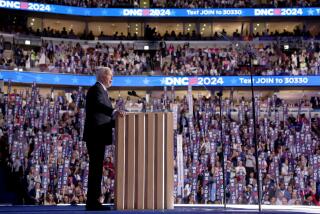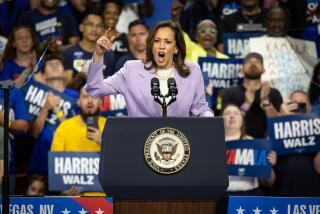GOP Weighs Options, Finds 1 Left: Massive Attack on Clinton : Campaign’s strategy relies on raising doubts about the challenger’s draft record, actions as Arkansas governor, economic plan and stance on key issues.
- Share via
WASHINGTON — By unveiling his “Agenda for American Renewal” amid much fanfare last week, President Bush fostered the impression that he wanted to turn the presidential campaign into a high-level debate over economic policy.
But that notion was effectively undermined by the hullabaloo over the back-to-back appearances of both the President and Democratic challenger Bill Clinton at the National Guard Assn. convention in Salt Lake City, where the focus was on the prolonged controversy over Clinton’s Vietnam War draft record.
Even before Bush appeared on stage Tuesday, his voice choked with emotion as he implicitly questioned whether Clinton met the “highest standard” for sending young Americans into battle, the real outlines of the President’s strategy were emerging.
“We know what they’re going to try to do and that’s destroy Bill Clinton,” said one former Southern Democratic governor connected with the Clinton high command.
Republican strategists put it differently. “We don’t use the ‘A’ (attack) word or the ‘N’ (negative) word,” said one Administration insider. “We call it ‘contra”
“We’d like voters to know what they are buying here,” said David Tell, a Bush campaign senior policy adviser heavily involved in opposition research.
But they leave little doubt that their campaign will be dominated by a massive assault on Clinton’s trustworthiness, with particular attention to the draft issue.
“The biggest thing that’s going to happen in the next seven weeks is that people are going to know a lot more about Clinton than they do now,” said Bush campaign pollster Fred Steeper.
There are risks to this attack strategy because the Democrats are certain to mount a counterbarrage charging that the GOP attack is merely a smoke screen to make voters forget the sorry state of the economy. But the Republicans seem to have little choice but to go after Clinton’s character, hammer and tongs.
At this late date even Republicans concede that the President’s “renewal agenda”--largely a melange of earlier proposals--has little chance of changing voters’ minds about his ability to manage the economy.
“People were saying: ‘You have to have a plan,’ and we had to get over that,” explained a senior White House official. “Nobody ever thought it was the Messiah.”
“So far as Bush is concerned, whatever people think about his leadership abilities, nothing can be done about that in the next few weeks because he has been around for four years and has a record and set of impressions,” said Everett C. Ladd, director of the Roper Center for Public Opinion Research at the University of Connecticut.
Nor does the prospect of face-to-face candidate debates offer much hope of closing the gap.
Barring a dramatic mishap by Clinton, unlikely in view of his seasoning in such confrontations during his campaign for the nomination, Republicans see little hope of Bush picking up much ground. They point out that, other things being equal, it is the challenger rather than the incumbent who generally benefits most from such dual exposure.
That leaves the Republicans with a battle plan designed to nibble away at Clinton’s lead by a point or two a week by demonstrating the challenger’s alleged untrustworthiness.
To close the 12- to 15-point gap with Clinton, says GOP pollster Vince Breglio, who worked for the Bush campaign in 1988, the GOP “must shift voter attention away from the question of ‘Who is best positioned to get the economy moving?’ to ‘Who do you trust to run the country for the next four years?’ That’s the question they want voters to take to the ballot box in November.”
Besides the draft, there are three main lines of attack intended to underline the trust question and help convince voters that Clinton is not what he claims to be:
--Clinton’s gubernatorial record. By depicting Clinton as “the failed governor of a small state,” Republicans hope to rebut the central claim of his candidacy: that he can lift the nation out of the economic doldrums.
“After having Gov. Clinton for 12 years, one in four folks in Arkansas don’t even have health insurance,” Bush told a pancake breakfast in Painseville, Ohio, on Labor Day. “And Bill Clinton has promised he’ll do for America what he’s done for Arkansas. And my question is, why should we let him?”
--Clinton’s economic plan. The thrust of the Republican argument is to attempt to expose as fraudulent another Clinton claim--that he is “a different kind of Democrat” from the “taxers and spenders” of the party’s past.
“He wants to raise taxes by $150 billion,” Bush told a Labor Day picnic in Waukesha, Wis. “And that’s just for openers.”
--Clinton’s campaign performance. By concentrating on Clinton’s tendency to shift ground on controversial issues, Republicans figure they can generate more evidence for their case against the Democratic standard-bearer.
“He tries to have it both ways,” Vice President Dan Quayle charged last Sunday on ABC’s “This Week With David Brinkley.” “He has a problem with the draft. He has a problem telling us whether he’s for the North American Free Trade Agreement. . . . He has a problem telling us where he stands on the F-15 sales to Saudia Arabia.”
As Quayle’s remarks suggest, Republicans see the draft controversy as a linchpin to the character issue, tying together all the other parts of their argument.
“We’re going to keep working on it,” says Bush pollster Steeper, who sees the draft issue in two parts. “One is that he took steps to avoid service, and the other is whether he has been completely forthcoming about the steps he took. So even if people forgive the first, they are less likely to forgive the second if they are convinced he has been evasive about it.”
Democrats say their polls show that the draft issue has not cut into Clinton’s lead. But Paul Tully, Democratic Party national political director and chief liaison to the Clinton campaign, admits it creates “noise” that interferes with Clinton’s economic message.
In his speech to the National Guard meeting in Salt Lake City, Bush avoided attacking Clinton directly about the tangled tale of maneuvering that allowed him to avoid military service. But the former World War II Navy flier did remind his military audience of those who paid the ultimate price of war, in an unspoken but hard to miss contrast with Clinton.
“We can never forget that we ask our presidents to lead the military, to make the awful choices of asking your sons and daughters to go into harm’s way,” Bush said.
Just by appearing at the guard conclave--and prompting Clinton to change his plans and show up too--the President got the controversy onto TV news and the front pages of most newspapers.
For his part, Clinton ignored the issue in speaking to the guardsmen. Instead, he focused on his plans for streamlining national defense and on the need to overhaul the economy.
Over the long run, his advisers are determined to keep voter attention focused on such issues. But they are braced for the Republican onslaught on the draft and other fronts and are determined to beat it back.
“This ain’t 1988,” says Tully, recalling the failure of that campaign’s Democratic nominee, Michael S. Dukakis, to respond to Bush’s attacks on him. “ We’ll never let that happen again.”
Times staff writer Doyle McManus contributed to this story.
More to Read
Get the L.A. Times Politics newsletter
Deeply reported insights into legislation, politics and policy from Sacramento, Washington and beyond. In your inbox twice per week.
You may occasionally receive promotional content from the Los Angeles Times.










